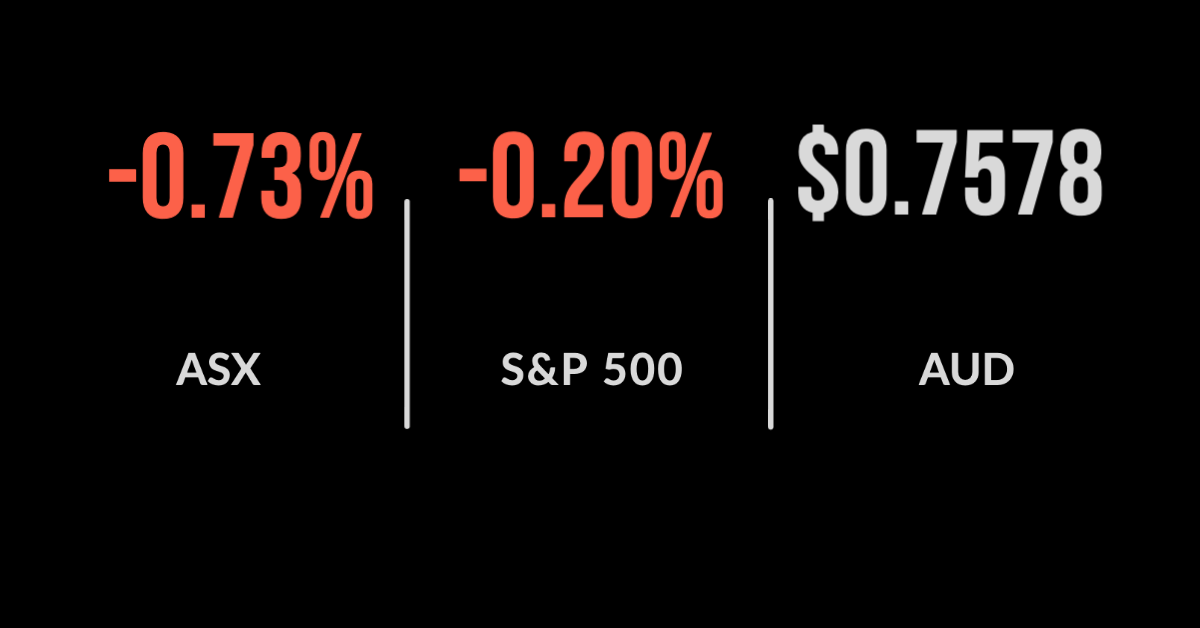ASX sags 0.7% as RBA starts road to tightening
ASX sinks, RBA’s taper tantrum, Lew hits Myer again
The ASX 200 (ASX: XJO) closed around its lows on a busy Tuesday with the long-awaited monetary policy decision released at 2pm sending the market into negative territory.
Every sector barring energy, which is benefitting from an OPEC impasse, finished lower with bond proxies including communications and healthcare among the hardest hit, falling 2% each.
On a company-specific level, Oil Search Ltd (ASX: OSH) and Whitehaven Coal Ltd (ASX: WHC) led the way, jumping 4.6% and 4.0%, respectively, with the OPEC impasse seen as the worst in several years and potentially harming the economic recovery as Saudi Arabia and Russia are now refusing to meet.
Myer Holdings Ltd (ASX: MYR) was back in the headlines with the share price jumping 14.9% after Solomon Lew disclosed that his Premier Investments Limited (ASX: PMV) had increased its stake in the company from 10% to 15%.
Lew is once again calling for the board to resign suggesting they are sitting on their hands amid the worst environment for retail in history.
Bigger issues at play as RBA tapers, Ramsay ups offer, PolyNovo smashed
It was all about the Reserve Bank of Australia on Tuesday as the Governor delivered a wide-ranging update discussing everything from the economic recovery to full employment and the future of monetary policy.
Both positive and negative news was delivered, with the cash rate remaining on hold at 0.1% and the central bank continuing to target the same rate for the 3-year government bond yield.
This is achieved by ‘printing’ money and purchasing the bonds on issue to keep the ‘yield curve’ flat, which has the impact of keeping the interest rates used for borrowing across the country at near-record lows.
The biggest news, however, was that the current rate of bond buying, being $5 billion per month, would be tapered to $4 billion from September, reducing the support to bond markets and the economy.
This was delivered with a caveat though, with the Governor noting there was no fixed strategy and that “there are plausible alternative scenarios”.
He confirmed that the cash rate would remain on hold until at least 2024, noting the impact that closed borders are having on the economic recovery.
The board reiterated their view that these would only be brought forward when inflation is sustainably between 2-3%, noting that unemployment would likely need to fall to 4% to achieve this.
Amazon’s record as contract cancelled, DiDi pulls China stocks lower, markets falls
US markets were negative overnight, the S&P 500 and Dow Jones dropped 0.2% and 0.6%, respectively, after an incredible run of new record closes.
The falls came as bond yields fell on the back of a weaker than expected PMI for services in the US economy, with both energy and smaller companies leading the index lower.
The Nasdaq, however, managed to deliver another record close, adding 0.2%, behind Amazon’s highest close in ten months.
Amazon.com, Inc. (NYSE: AMZN) added 4.7% after the US Department of Defense announced they were withdrawing from the JEDI cloudcontract that Microsoft had won, leaving hope that Amazon may be in the running for the US$10 billion deal.
This came on the same day that Jeff Bezos finished up formally at the company.
DiDi Global (NYSE: DIDI) continued to tank, falling 20%, after the Chinese regulator’s aggressive action, dragging the major Chinese listed names down with it, including Alibaba Group (NYSE: BABA) and Tencent, with both falling around 3%.







